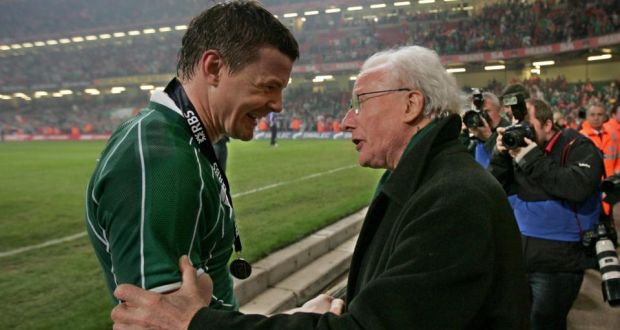A selection of tributes to the late great Jack Kyle, fixed in the minds of my generation as the ideal sportsman. It was in a way fortunate that in the days of the amateur game, a man’s character could be expressed in other fields.
From the Irish Times
Out-half on the Grand Slam-winning Irish rugby team of 1948, the Belfast surgeon played 46 times for Ireland and another six with the British and Irish Lions.
He won a Grand Slam, two triple Crowns and another Five Nations in 1951 and played on for Ireland until 1958. Upon his retirement, he was the world’s most-capped rugby international.
Because Jack Kyle stopped playing rugby in the late 1950s, several generations of people never got to see him playing in the flesh. But his name has become a kind of shorthand for sporting talent, and for attitude and manners which both reflected a certain era and transcended it. For much of this week, Irish sport has revolved around a debate on the right way and wrong ways of conducting yourself.
Jack Kyle was one of Ireland’s greatest rugby players. Known for his deft, elusive moves, he was nicknamed the Ghost and the Scarlet Pimpernel. When a new scrum half once asked him where he should pass the ball, Kyle replied, “Just pass it as far as you can and I’ll catch it.”
However, to thousands of people living in Africa, he was simply “Dr Kyle”. When his playing career ended he moved to the continent as a surgeon and spent three decades working in a hospital in a mining town in Zambia.
A deeply modest man, Kyle said: “I was only the second opinion. They always saw the witch doctor before they saw me,.
He made a lasting impact on the late Cliff Morgan after the legendary Wales and Lions out-half – and also a playing contemporary of Kyle – saw him play for the Barbarians.
Morgan said: “He was so beautifully balanced and had this gift of lulling opposition into a false sense of security. You’d think he was doing nothing, and yet in an instant he’d pull the ball back, and there he was in a position to score or make a try.”
And famously, the Irish Independent wrote of Kyle in 1953 after Ireland had played France:
“They seek him here, they seek him there,
Those Frenchies seek him everywhere.
That paragon of pace and guile,
That damned elusive Jackie Kyle.”
From The Times (£)
Kyle’s daughter, Justine, who was born in Zambia, returned to Ireland to boarding school and was taken to watch a rugby match, she recalled: “All these men came over and they were going on and on and on about dad.” She later wrote a memoir about his life. “He always felt that rugby was a gift which just came naturally to him because he played on instinct. But I think he felt that the surgery was much more difficult to achieve.”
Of his rugby, Kyle agreed. “These things are done on a subconscious level. The ball goes into your arms, and suddenly an opening appears and away you go.”
Both his children settled in Ireland and, finally, in his mid-70s he followed them, retiring to a house in Co Down. He had always maintained close links with his homeland. No Ulsterman was more popular in the Republic than Kyle. He expressed pleasure that it was for the whole of Ireland that he played rugby.
From the Guardian
In 2002 Kyle was voted Ireland’s greatest player, underlining his standing alongside Brian O’Driscoll and Willie John McBride as the country’s most-celebrated rugby players.
Rory Best led widespread tributes by hailing Kyle as “a genius of the game”. The Ulster and Ireland hooker said: “I remember my father and grandfather talking about Jack Kyle and what a great player he was in his time. But for him still to be looked upon by modern-day players as a genius of the game shows what a legend he was.
“There are very few players who transcend generations like he has done, but when you look back at clips of some of the stuff he did, he was well ahead of his time.
“We talk about his playing achievements but he was a real gentleman as well as a rugby great. I’ve met him a few times, particularly in 2009 when we won the Grand Slam, and he spoke so fondly of his time playing rugby.
“He spoke so graciously to us and you genuinely felt that he was happy to share what we’d been through because he’d done it back in 1948.
“He never tried to force anything on you but he had so much knowledge to impart that you couldn’t help but listen and be engrossed by what he had to say.
“There is a wonderful tribute to him in the new tunnel at Kingspan Stadium and it’s very special to have his legacy to inspire us.
“He was one of the greatest players to ever play the game and it’s a privilege to follow in his footsteps as an Ulster Rugby player.”
Former BBC journalist and manager in Belfast, Manchester and London, Editor Spolight; Political Editor BBC NI; Current Affairs Commissioning editor BBC Radio 4; Editor Political and Parliamentary Programmes, BBC Westminster; former London Editor Belfast Telegraph. Hon Senior Research Fellow, The Constitution Unit, Univ Coll. London
Discover more from Slugger O'Toole
Subscribe to get the latest posts to your email.

